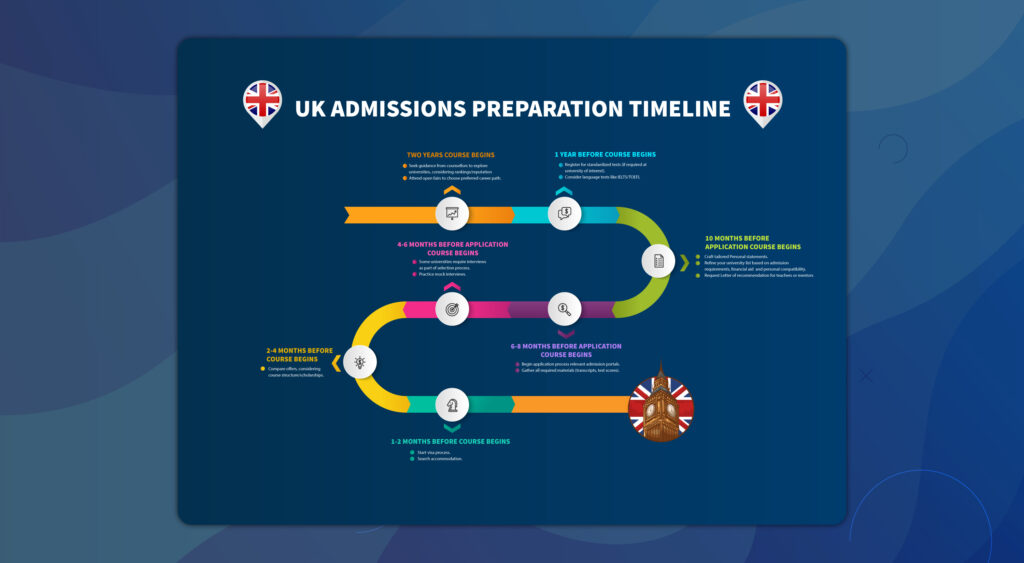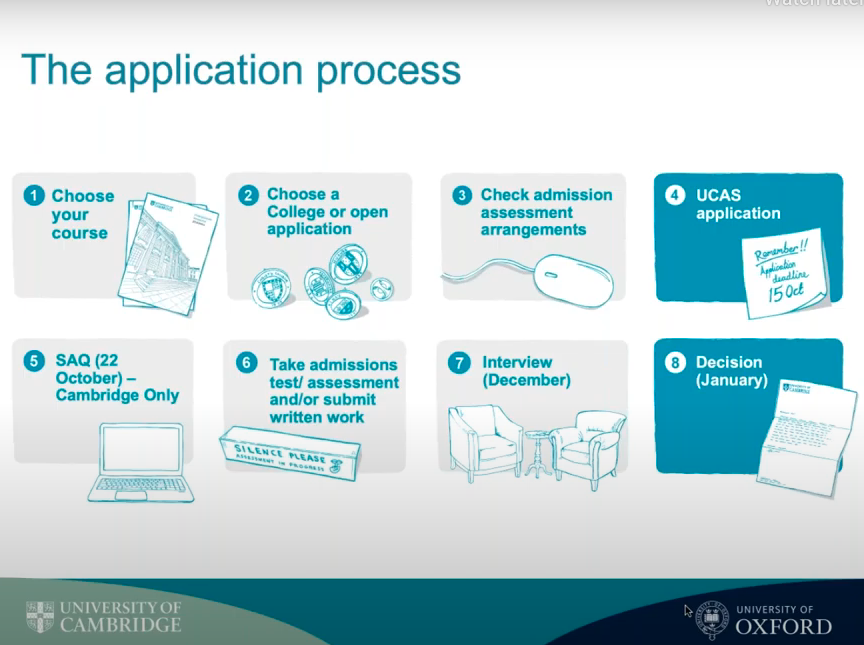Getting into a UK university has a few steps. First, pick the universities and courses you like. Then, fill out an application on UCAS, where you share your info and why you want to study there. Check if you meet the requirements for your chosen courses. Send your application before mid-January if you’re starting in the fall. Keep track of your application on UCAS Track.
If needed, get ready for interviews. Universities might offer you a spot, or they might not. Decide which offers you want to accept. If you’re from another country, you’ll need a student visa. Just stay organized, meet deadlines, and ask for help if you need it!
How to prepare for UK university applications?

Preparing for UK university applications involves several steps to ensure you present yourself as a strong candidate. Here’s a general guide:
- Find Universities: Look for universities you like and check what they offer.
- Choose Courses: Pick the courses (subjects) you want to study.
- Check What You Need: See what grades and qualifications you need to get in.
- Study Hard: Try your best in school to get good grades.
- Join Clubs: Join activities you enjoy outside of school.
- Write About Yourself: Write a short story about yourself, saying why you want to go to university.
- Ask for Help: Get a teacher or someone who knows you well to write a letter saying good things about you.
- Apply Online: Apply online through a website called UCAS.
- Take Tests (if needed): Some courses might need you to take a special test.
- Get Ready for Interviews (if needed): If they want to meet you, practice talking about yourself.
- Think About Money: Check how much it costs and if you can get help to pay for it.
- Know About Visas (if you’re from another country): If you’re from another country, check what you need to come to the UK.
- Stay Organized: Keep track of everything and make sure you do it all on time.
What are the components of a UK university application?
A UK university application typically consists of several components:
UCAS Application
The UCAS application is the central hub for undergraduate applications to universities in the UK. It streamlines the process by allowing you to apply to multiple universities and courses through a single platform.
To complete the UCAS application, you’ll need to provide personal details such as your name, address, and contact information.
Personal Statement
Your personal statement is your opportunity to showcase your passion for your chosen subject and demonstrate why you’re a suitable candidate for the courses you’re applying to.
You should discuss your academic interests, relevant experiences, extracurricular activities, and career aspirations. It’s crucial to tailor your personal statement to each course and university to which you’re applying.
Academic Qualifications
This section of the application requires you to input details of your academic qualifications, including your high school grades or predicted grades if you haven’t completed your studies yet. UK universities typically require qualifications such as A-levels, International Baccalaureate (IB) diplomas, or equivalent qualifications for international students.
References
You’ll need to provide contact details for a reference who can comment on your academic abilities, character, and suitability for higher education.
This is often a teacher, tutor, or school counselor who knows you well academically and can provide insight into your potential to succeed at university.
Additional Requirements
Depending on the course and university, there may be additional requirements beyond the standard UCAS application. For example, some courses may require you to take admissions tests such as the UK Clinical Aptitude Test (UKCAT) or the BioMedical Admissions Test (BMAT).
Certain universities may also conduct interviews or request portfolios for creative subjects like art or design.
Application Fee
Submitting your UCAS application typically incurs a fee, which covers the administrative costs of processing your application.
However, there are exceptions to this fee, such as if you’re only applying to one course at one university or if you’re eligible for financial assistance or fee waivers.
How does the UK university application review process work?
The UK university application review process follows several distinct stages. Initially, upon submission of your application through UCAS, universities receive your details electronically. Admissions staff or faculty members then conduct an initial screening to ensure you meet the minimum academic requirements for your chosen course. Your personal statement is carefully assessed to gauge your motivation, enthusiasm, and suitability for the subject.
Additionally, your reference is scrutinized to gain insight into your academic abilities and character. If there are additional requirements for your course, such as admissions tests or interviews, these are taken into account during the review process. Based on this comprehensive evaluation, admissions staff make decisions regarding your application, which could include offers of a place, rejections, or placing your application on hold.
Communication of decisions is through UCAS Track, and once offers are received, you must reply by the specified deadline. Clearing and Adjustment options are available for those who haven’t received offers or wish to explore alternatives. Overall, the process aims to assess your academic qualifications, personal attributes, and suitability for higher education through a holistic review.
FAQs
How do I apply for undergraduate admission in the UK?
To apply for undergraduate admission in the UK, you typically need to complete the UCAS application online, choose your universities and courses, provide academic qualifications, write a personal statement, and submit any required documents.
Is overall 5.5 bands eligible for UK?
Whether an overall IELTS band score of 5.5 is eligible for admission in the UK depends on the university and the specific course requirements. Some universities may accept this score, while others may require a higher score.
Does UK accept normal IELTS?
Yes, the UK accepts the standard Academic version of the IELTS (International English Language Testing System) for most university admissions.
Is IELTS required for UK visa?
Yes, for most types of UK visas, including study visas (Tier 4), applicants are required to provide proof of English language proficiency, which is typically demonstrated through the IELTS test.
Is IELTS necessary for UK visa?
Yes, for most types of UK visas, including study visas (Tier 4), applicants are required to demonstrate their English language proficiency, often through the IELTS test, as part of the visa application process.
Final Words
Applying to universities in the UK means doing some important things. First, students need to look at different universities and courses to see which ones they like best. They should also make sure they have the right grades and can speak English well enough to get in. It’s also important to think about how much money it will cost and if there are any scholarships available to help pay for it.
By staying organized and asking for help when needed, students can make sure they have the best chance of getting into the UK university they want.



